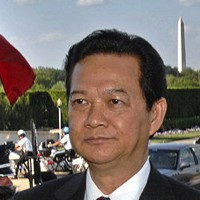Vietnam has made international headlines in recent weeks, but for all the wrong reasons. Vietnam’s dynamic economy, which until recently dominated news coverage of the country, has been replaced by accounts of economic decline, political infighting and the arrest of leading figures tied to the party leadership.
Until a few years ago, because of its remarkable economic growth -- about 7 percent a year -- Vietnam was considered one of the world’s hottest emerging markets and a rising Asian star racing to catch up with its neighbors. However, all of that is apparently over: The country’s economy has slowed sharply, signaling the end of its economic miracle. It is now facing serious difficulties, including rising inflation and high debt, and there are growing fears of an “economic meltdown.” Furthermore, with the boom years now gone, a number of entrenched structural problems are looming large.
Like China, Vietnam’s economy is dominated by state-owned enterprises (SOEs), which the government uses as a means of maintaining political control over the economy. However, many of the SOEs are run by politically connected and often incompetent officials, who are free to expand their businesses into areas where they have little or no expertise. As a result, corruption, poor management and, consequently, enormous debts are commonplace.

